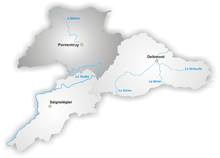Ajoie
The Ajoie [ aʒwa ] ( German Pruntruter Zipfel , formerly Elsgau ) is a landscape in the north of the Swiss canton of Jura .
The capital of the Ajoie is Pruntrut , the second largest city in the canton of Jura. The Ajoie extends over an area of around 300 km² at around 400 to 600 m above sea level. M. It is characterized by a tabular Jurassic landscape, most of which is drained through the Allaine to the Doubs . This wide, fertile area with calcareous soils is considered the Jura orchard and produces the creeping plums for the famous Damassine brandy. Ajoie as an excursion destination offers various caves (Grottes de Réclère), dinosaur tracks, a prehistoric park, the Bressaucourt airfield and attractive covered wagon routes.
Politically, the Ajoie consists almost exclusively of the Pruntrut district .
history

The Ajoie is first mentioned in a document from 732, when the Duke of Alsace transferred lands in pago Alsegaugensi to the Murbach monastery . The rule over the Ajoie changed frequently in the following years, until it fell under the secular power of the Prince-Bishop of Basel in 999 . Ecclesiastically only La Baroche belonged to the diocese of Basel until 1779 , while the remaining areas of the Ajoie belonged to the diocese of Besançon .
Since the prince-bishopric ran into financial difficulties in the 14th century, almost the entire Ajoie was sold to the Counts of Württemberg-Mömpelgard (Montbéliard) in 1386, but was released again in 1461 by Prince-Bishop Johann V. von Venningen . When further lordships and villages of the Ajoie fell to the prince-bishopric ( Roche-d'Or in 1474, Rocourt 1573, Miécourt and Beurnevésin 1625), the history of the Ajoie took the same course as that of the prince-bishopric of Basel.
Attractions
literature
- Dominique Prongué: Ajoie. In: Historical Lexicon of Switzerland .


